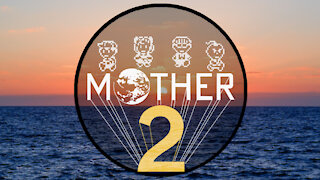Premium Only Content

O Mother Dear, Jerusalem
"O MOTHER DEAR, JERUSALEM"
"He…showed me that great city, the holy Jerusalem, descending out of heaven from God" (Rev. 21:10)
INTRO.: An old hymn which looks forward to that great city, the holy Jerusalem, which God has prepared for His people in heaven is "O Mother Dear, Jerusalem." The text is an anonymous Latin hymn, "Mater Hierusalem, civitas sancta Dei," that may be based on a passage from the Liber Meditationes often ascribed to Aurelius Augustine of Hippo (353-430). Some believe that the Meditations were a forgery. A versified form of some of these meditations entitled "Ad perennis vitae fontem" was made in Latin by Cardinal Peter Damian (c. 988-1072). An old English translation appeared in a British manuscript dating to the sixteenth century, from around 1580 or so, and titled, "A Song made by F. B. P.," which some think may stand for "Francis Baker, Priest." Another well-known hymn, "Jerusalem, My Happy Home" as arranged by Joseph Bromehead (and others), was taken from this same source. The section beginning, "O Mother Dear, Jerusalem," was arranged by William Prid in 1585, and further altered to its present form by David DIckson (1583-1663).
The tune (Materna) most commonly used with this hymn was composed specifically for this text by Samuel Augustus Ward, who was born on Dec. 28, 1847, at Newark, NJ, the son of George Spencer and Abbie Ann Tichenor Ward. After studying music under Jan Pychowski and others in New York City, NY, he returned to Newark and married Virginia Bell Ward (no relation). Opening a music store in Newark, he later became music director at Grace Episcopal Church. An employee of Ward’s music store said that in 1882, while Ward was crossing New York Harbor after a day’s outing at Coney Island, the composer jotted the melody down on his cuff and it was later sung at Grace Episcopal Church. However, Ward’s son-in-law, Henry W. Armstrong, stated that the tune was composed in memory of Ward’s oldest daughter, Clara, who died in 1885. In any event, the tune was first published in a periodical, The Parish Choir (1889?), and its first hymnbook inclusion was in Charles L. Hutchins’s The Church Hymnal of 1894 with "O Mother Dear, Jerusalem." In addition to his store and church work, Ward was active in the musical life of his hometown and founded Newark’s Orpheus Club in 1889, serving as president until 1900, and then died in Newark, NJ, on Sept. 28, 1903.
In 1912, the president of Massachusetts Agricultural College requested permission from Ward’s widow to use this tune with Katherine Lee Bates’s patriotic anthem, "America, the Beautiful," beginning, "O beautiful for spacious skies" of 1893 (which was not published until 1899), and most people are probably more familiar with that usage than with the hymn. Among hymnbooks published by members of the Lord’s church during the twentieth century for use in churches of Christ, "O Mother Dear, Jerusalem" appeared in the 1921 Great Songs of the Church (No. 1) edited by E. L. Jorgenson. The tune was used with "America, the Beautiful" in the 1937 Great Songs of the Church No. 2 also edited by Jorgenson; and the 1963 Christian Hymnal edited by J. Nelson Slater. Today, the tune with Bates’s song may be found in the 1971 Songs of the Church, the 1990 Songs of the Church 21st C., and the 1994 Songs of Faith and Praise all edited by Alton H. Howard; the 1977 Special Sacred Selections edited by Ellis J. Crum; the 1986 Great Songs Revised edited by Forrest M. McCann; and the 1992 Praise for the Lord edited by John P. Wiegand. The only other modern book in which I have seen "O Mother Dear, Jerusalem" is the 1961 Trinity Hymnal of the Orthodox Presbyterian Church.
1.O Mother dear, Jerusalem! When shall I come to thee?
When shall my sorrows have an end? Thy joys when shall I see?
O happy harbor of the saints! O sweet and pleasant soil!
In thee no sorrow may be found, No grief, no care, no toil.
2.No murky cloud o'ershadows thee, Nor gloom, nor darksome night;
But every soul shines as the sun, For God himself gives light.
O my sweet home, Jerusalem, The joys when shall I see?
The King that sitteth on thy throne In his felicity.
3.The gardens and thy goodly walks Continually are green,
Where grow such sweet and pleasant flowers, As nowhere else are seen.
Right thro' the streets, with silver sound,The living waters flow,
And on the banks, on either side, The trees of life do grow.
4.Those trees for evermore bear fruit, And evermore do spring;
There evermore the angels are, And evermore do sing.
Jerusalem, my happy home, Would God I were in thee!
Would God my woes were at an end, Thy joys that I might see!
AUAWN0324221
-
 0:10
0:10
luvlightruword
4 years ago $0.03 earnedBlessing Jerusalem
124 -
 0:16
0:16
Ahmed_ahmer
4 years agocare mother
170 -
 7:43
7:43
AFV
4 years agoMother Nature
2.54K3 -
 0:36
0:36
The Danny Joines Channel
4 years agoHear Jerusalem Moan
1291 -
 1:02:15
1:02:15
djthepirateking
4 years agoMother 2 (Earthbound) Part 2
65 -
 0:14
0:14
animal's world
4 years agoMother and her puppies
784 -
 1:08:57
1:08:57
djthepirateking
4 years agoMother 2 (Earthbound) Part 3
58 -
 36:11
36:11
djthepirateking
4 years ago $0.01 earnedMother 2 (Earthbound) Part 1
76 -
 0:58
0:58
Maxamfrce
4 years agoMother and Fawns
119 -
 0:24
0:24
Shtuff
4 years ago $0.03 earnedMother spirit
1802